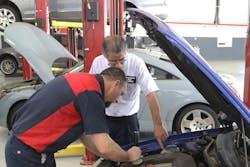Kevin Leischner distinctly remembers walking into International Auto Specialist for a training class on new vehicle technology. He looked around the shop, and took note of the tools and equipment for the luxury vehicles it specialized in; he quickly noticed the emphasis on adapting to new technology. More than anything, though, he was impressed with the training regimen and the class offered at the Fredericksburg, Va., shop.
Leischner saw cars he had never seen before as a technician, and realized that the staff at this shop specialized in vehicles that his current shop usually sent off to the dealership. That’s when he made the decision to join the team.
And that’s how owner Bob Sorkhe recruited one of his best employees, all thanks to his training program.
After inquiring about an open position and being hired as a technician, Leischner has now worked at International Auto Specialists for over six years, moving up the ranks to become its lead technician.
International Auto Specialist is adding a new shop this year, and recruiting technicians will be an important next step. Laying the groundwork for the shop’s dedication to technology and training has been vital in building the shop’s reputation, and retaining and recruiting new technicians.
The Backstory
International Auto Specialist has been around since March 1984, running as a one-man operation led by Sorkhe until 2005.
The shop specializes in foreign car service and repair, specifically BMW and Mini Cooper lines. The staff and customer base have grown significantly since shifting from a one-man shop, and Sorkhe recently opened a second, much larger location after the business outgrew the original facility.
Sorkhe says the decision to increase training in his shop about 12 years ago came from one simple issue.
“There was one car in the shop that we couldn’t fix,” Sorkhe says. “So, I decided that everybody needs more training.”
His group of technicians were doing an adequate job, but Sorkhe thought additional training would help them handle any complex issues from European cars coming into the shop. Sorkhe, who has worked on cars since he was 9 years old, says that once new technology began to enter the market, training became an absolute necessity for all members of his shop.
Leischner joined about six years ago, starting as a technician. He eventually started splitting diagnosing efforts with Sorkhe, and is now the shop’s lead technician, overseeing all work coming into the shop.
The Problem
Leischner says that the closest BMW dealer is 50 miles away, and many customers bring cars that are still under warranty to International Auto Specialist. Because of that, the shop needs to stay on top of the newest technologies, and the newest issues plaguing these vehicles.
Sorkhe says that European vehicles require significant training efforts, which requires a big investment in time and money. To give his staff an incentive to stay with the company long term, and attract new technicians when needed, Sorkhe wanted to put an extended emphasis on staying ahead of European vehicle training and technology.
Doing so isn’t quite that simple, though. Training can be costly. It can be time consuming. And for many, there isn’t a clear starting point.
The Solution
When finding ways to boost his shop’s training, Sorkhe spoke with Rob Morrell, director of training from WORLDPAC, as it was one of the only training companies that works with European vehicles. Sorkhe and Morrell set up a training process, and the International Auto Specialist staff took classes at least three to four times per year.
Sorkhe mainly focuses on classes that come up new on body, electronic and engine management trends, but also makes sure his staff attends classes like service advisor training.
Since roughly 75 percent of the shop’s work mix is BMW, this takes a special emphasis on the shop’s training. He has one technician who is officially BMW certified, while every other employee has been to varying amounts of BMW classes. Some examples of classes are ones for BMW electronic systems, and classes detailing the BMW Engine 3 or Engine 4.
Each class costs roughly $500 per technician, and he usually sends three staff members to each. Hotel rooms, gas and food are all added on to the cost, but since classes are on the weekends, the staff generally doesn’t miss any work time, and gets paid while attending training.
As the shop’s services grew, the training grew, as well. Since the new shop offers Jaguar and Land Rover servicing, Sorkhe plans to attend training for these vehicles in May.
He also implemented a diagnostic system training, which has grown significantly throughout the years. After taking an initial class, Leischner says that training simply involves working on the systems and getting used to the program itself. Sometimes, he says, he has to stay extra hours to be able to learn the system and explain it to his employees.
While they haven’t made any specific investments yet, the shop is preparing for the incoming wave of electric vehicles. Leischner will attend the WORLDPAC Supplier & Training Expo in May, and take some classes on servicing EVs.
The Aftermath
Technicians are very happy with the training, and Leischner says it has helped boost technician retention. Leischner was the last person hired, and he says they haven’t had any departures, save for a technician who had a heart attack and couldn’t work anymore.
Because of the success of the shop and customer overflow, Sorkhe and his team bought and opened a new shop in early 2018. This opened up several new technician positions. Sorkhe and Leischner say they’ve had almost no trouble drumming up interest.
Leischner says that the only advertising they did for the new shop was putting up a sign that said “coming soon,” and Sorkhe says they received strong applications from about 10 people. These included master technicians from Porsche and Audi dealerships, and even an ASE-certified technician from New Jersey. This allows them to be more selective with their hiring process, as the team can look beyond ASE certifications to experience with specialized training and BMW classes.
So, what’s the secret?
“It’s our reputation. People know, and that’s the reason why we’ve had people asking for jobs before the shop’s even open,” Leischner says. “We get a ton of work in here from other shops from our training and technology. We’re able to finish fixing a job that they’ve started.”
The Takeaway
Sorkhe knows that if his shop or any other shop servicing German vehicles stays behind on training, it will be impossible for them to catch up.
“Every shop has to know the investment of a technician is an important part of success in their business,” Sorkhe says. “If they cannot invest in the technology and their technicians, they aren’t going to be in the business too long.”
Expert Insight: Importance of Training
—
Chris Chesney has been the senior director of customer training from CARQUEST Technical Institute for over 16 years, and manages a team of instructors and managers. He gives some insight on the importance of all types of training, and how you can construct an effective yearlong training program in your shop.
Your training program should depend on the services you provide, your vehicle mix and more importantly, the current assessment of your team. You want to try to schedule training that addresses specific needs with your staff. This helps drives interest for the attendee and helps grow that person down that career path. Have you identified or explained that career path to your team so they understand what’s in it for them? These classes are an important part of the growing process.
Don’t get tied into the idea that all you need is the specialized training. You still need to grow your young people with foundation skills to be able to implement that specialized training effectively. At the same time, if you have supremely skilled technicians with great foundation skills, don’t waste their time putting them through foundation skills training when they need specialized training.
The industry itself is trying to be more visible and try to provide some guidance to the repair facilities. In the future we need to offer a structured career path that is supported by training that allows them to go from entry-level training all the way through their career, including the specialized classes.
SHOP STATS: International Auto Specialists Location: Fredericksburg, Va. Operator: Bob Sorkhe Average Monthly Car Count: 158 Staff Size: 12 Shop Size: 3,900 square feet; Annual Revenue;$1.3 million

